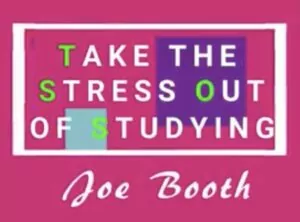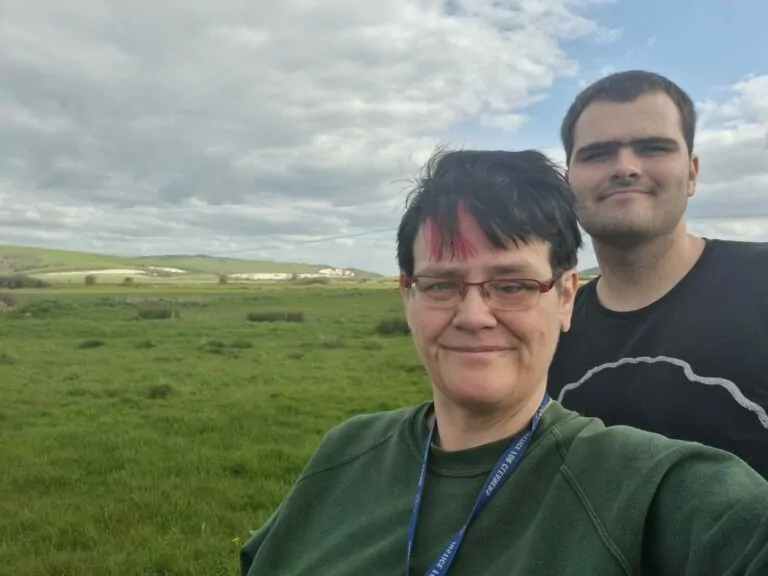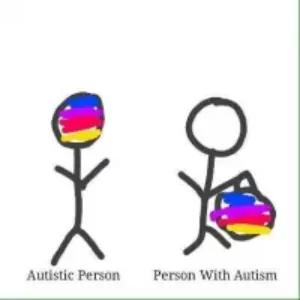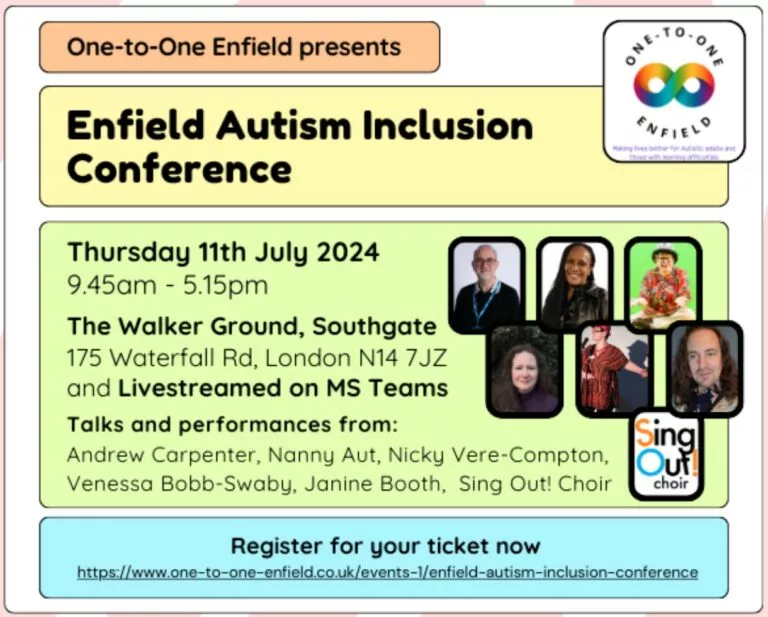Change school not us! An autistic student speaks out
This interview – filmed for use in teaching education workers about neurodiversity – sees Joe Booth, a young autistic adult, talk with Red in the Spectrum’s Janine Booth (his mum) about his experiences as an autistic student – in school and in college – barriers that he experienced, and things that he found useful to his learning.
You can watch this as a video and/or read the transcript of the interview below.
An autistic student speaks
Red in the Spectrum: Joe, can you start off by telling us a bit about your experiences as an autistic student at school?
Joe: Primary school – that was the age where I got diagnosed at first, so that was also the time when you and my dad were learning more about autism and more about what I needed. The primary school I went to was a good school in difficult times, and they had special needs TAs and services.
The only issue was that they were massively undertrained – they admitted that themselves. The TAs, who are all decent people, admitted they don’t have enough understanding of autism, and had to attend a lot of training courses after they found out I was autistic. That’s definitely something that needs to be sorted out.
R: How did you get along with how the teaching was presented to you? Like the tests you had to do, or the way that lessons were run? Were there things that particularly worked for you as an autistic student, or things that you found particularly difficult?
J: Plenty of things I found difficult, like getting along with other pupils was definitely difficult. Paying attention in class was difficult.
An autistic student at secondary school
R: Tell us about secondary school and what that was like for you.
J: The secondary school I went to had really good special needs support services relative to other schools. The school itself was an academy, which basically meant that it was well regarded by the system and Ofsted but disregarded by its students and parents because it was so repressive towards the students – special needs and not special needs – and there were so many things we had to complain about when we were in school as students and as parents. It was far too strict – students would get detentions for picking up pencils without permission – and we would always get a crapload of homework.
I know one or two other disabled, special needs students who were sent to the learning support unit for being in a gang of other disabled students.
Even with all the sufficient support services that they had, their primary focus was not trying to get the teacher to be clearer, it was trying to get me to understand what the teacher was saying clearer.
R: So, did you feel like school was trying to change you rather than trying to change itself to be more accessible to you as an autistic student?
J: That’s exactly what I think, yes.
R: What changes could the school have made in order to make learning easier for you as an autistic student?
J: My final TA from year 11 when I was 16, he was the first TA to write in reports, “Therefore the teacher needs to be clearer when demonstrating”, rather than “Therefore Joe needs to focus more”. That’s one thing I definitely think should be changed. Teachers should be encouraged to talk in the language of their students, which is, I admit, not easy because they are handling like 25 students an hour for 12 hours a day.
R: So you think if teachers had been clearer, it would have been easier for you to learn?
J: Well yeah, of course.
R: What else do you think they could have done that would have made it easier for you, as an autistic student, to learn?
J: I think one thing that they should not have done, which they were constantly doing, was trying to make me normal – which is nothing that they would admit to, but they were constantly trying to help me to understand the way neurotypicals speak and think, rather than admit that this is where neurotypicals can be a lot clearer in the way they speak.
R: It was while you were at secondary school, Joe, that you set up a campaign called Take the Stress Out of Studying. Can you tell us what it was about? How secondary school ran that you found stressful and what measures you were asking for to make it less stressful?
J: There were causes of stress within the school and there were causes of stress across the country, like exam pressure. I want to say it’s not for anyone, but I don’t know who it is for, because it’s just because all the unlimited amount of pressure students are put under to simply sit still for three hours, work at a fast pace, try to remember without any notes, the very rigid way that texts are explained.
There may be a minority of students who that might work for, but the majority either fail or only end up passing because they work their asses off and then end up with post-exam hangover, so to speak.
R: You did have some adjustments made for you as an autistic student. What were they and how well did they work for you?
J: That was extra time in exams, and taking my exams in a different room – a quieter room and smaller room – just on my own with a teaching assistant and with ear defenders. It was just a better sensory setting for me to complete the test.
In lessons, I was in the classroom with every other student and there was nothing really different about that.
R: Joe, what was your favourite subject at secondary school? And why?
J: That’s a difficult question to answer because they were all pretty good. I would have to say English.
R: Why do you like English?
J: I’d like to say because my English teacher was my favourite teacher, but it was more about the subject because unlike a lot of the other lessons, with English you learn so many different things and so many different perspectives. For example, you might have to learn a bit of history in order to familiarise yourself with the context of a poet.
An autistic student at college
R: Good point. So, when you finished school and did your GCSEs – and you did pretty well in your GCSEs – you went to college, but that didn’t go so well for you as an autistic student, did it? Tell us about what happened there.
J: I was there for two months, and when I think back to it, I think, what was I even doing there? Because I didn’t get any qualifications, it didn’t give me a new experience in life, nothing. The college I went to – New City College in Hoxton – had a notoriety for being a college that they just dumped students in that they didn’t know what to do with and of course I found that really patronising, because they didn’t make the effort to try to understand a subject that they think that I could get good at and sustain. Instead they put me onto a science course which I was struggling with all the time.
And the sensory settings that I was in in that one college were awful and that’s why I had to leave. It wasn’t just because I was tired of studying – that was the least of it – it was because I witnessed so much physical violence when I was there, so much loud noise in the classrooms, so much work going missing, and it was just unbearable. Even the other students and staff admitted it was a really nasty environment.
An autistic student in adult education
R: Since then you have done a few short courses, haven’t you, in adult education settings. Could you tell us about them?
J: Those short courses are for adults of all ages, so I was actually one of the youngest in the classes at the age of 22. This year, they were more like hobbies than actual education. They didn’t give us any homework. It was just an evening class that you were volunteering your time for.
What I would say is that in just the two courses that I did, I had nothing to complain about at all. For one of them – the Understanding Film course – the reason there was nothing to complain about is because it was actually a very simple course. It was just an hour-and-a-half class, making notes of what they were presenting, talking with your classmates about what you’ve gained out of it.
R: That’s a format that suits your learning style, is it?
J: Totally, yeah. And it suits a lot of people’s.
R: What is it that you like about it?
J: What I like about making the notes – it’s not like in a classroom setting, where you’re just staring at the teacher for the whole hour, and they’re testing your ability to listen. The actual presentation, that’s part of the lesson and you’re making notes of what you’re gaining out of it and if you’re not gaining a lot, that’s a chance to ask a question. And the benefits of talking to your classmates is that you’re asking for each other’s perspectives.
R: So, Joe, if you got a chance to tell teachers what they can do to make learning more accessible to autistic students, what advice would you give them?
J: Get them to familiarise themselves with the way most autistic people communicate. I say most because every autistic person’s different, but that means them taking things literally. I would say lay off all the jokes for one – you know, all the jokes that might make all the neurotypical students laugh but might confuse all the autistic students.
And if it does confuse them, don’t try to get the autistic person to understand and try to explain it to them, but instead make the effort yourself to understand the way they communicate and the way they learn because at the end of the day, the teacher is the teacher – they shouldn’t expect the students to know everything, they shouldn’t expect the student to do everything the way they wish.
Improving learning for autistic students
R: That’s all my questions, but have you got anything you want to add?
J: I think with any class setting, whether that’s a school, college or even a sports class, I think if anyone asks like if there’s loud music in the background or if there’s a lot of people talking and yelling – I think if any autistic student, or just anyone for a matter of fact, says it’s getting too loud and overwhelming, they should not have to explain themselves – just take it at face value. They’re not trying to be a control freak or anything when they say that, they’re literally just describing their own needs.
R: So if an autistic student says to a teacher, I really need to wear defenders or I really need to stand up and walk around for a bit because I’ve been sitting down too long, or I’m finding this room layout very distracting – that kind of stuff – then what you’re saying is you don’t want the teacher to interrogate them about why they feel like that but just accept it and try to adapt to it?
J: Of course. Too often I was told off for looking out the window during lessons and because as expected, they took that as me not listening, not focusing. They’d be like “Joe! Focus!”
It’s just natural that you’re going to acknowledge all the stimuli around you, and no matter what might be distracting you from listening, if you’re staring out the window or you’re sleeping and stuff – but even if that happens, they need to deal with that not by telling you off, or putting pressure on you, they need to deal with that by finding out what’s making you like that. If you’re falling asleep, it’s probably because you’re tired, it’s probably because you’re bored, it’s probably because the lesson’s going on for ages and not giving you a chance to digest.
Not only did they put a lot of pressure on me, they even used to give me detentions for looking out the window too much, which I thought was just sick, not just because it was repressive, but you know, giving an autistic person a detention for just taking one eye in the other way for just less than a second when they are listening – not just because there’s a big chance I’ll look out the window during the detention! – but it’s also like just not the way to deal with it.
One thing that needs to stop is insistence on eye contact. You can’t always help it, and you don’t listen with your eyes, you listen with your ears and your brain. That’s not only oppressive to autistic students who can find eye contact pretty relentless, but also quite racist to certain ethnic groups who might have a different approach to staring at someone who’s in a higher-up position.
R: Cool. Thank you very much!
Book a Red in the Spectrum training course!
Red in the Spectrum delivers training courses about neurodiversity, tailored to the needs of the host organisation. If you would like training in your education setting, or for any other organisation you are involved it, please contact us!






